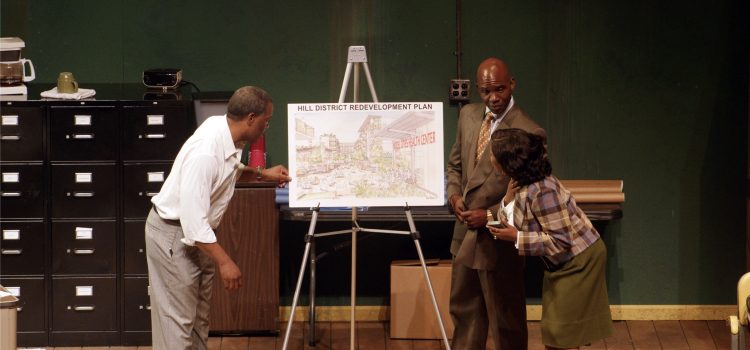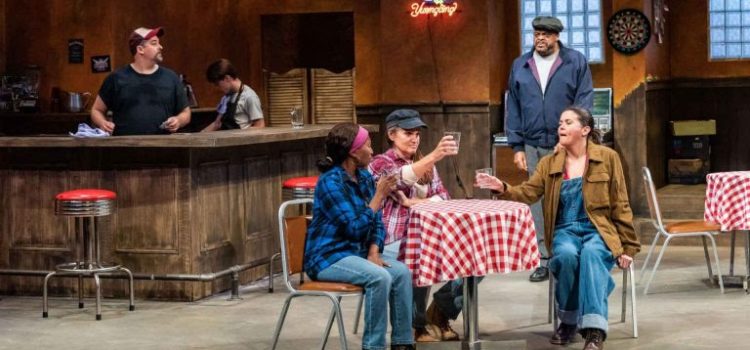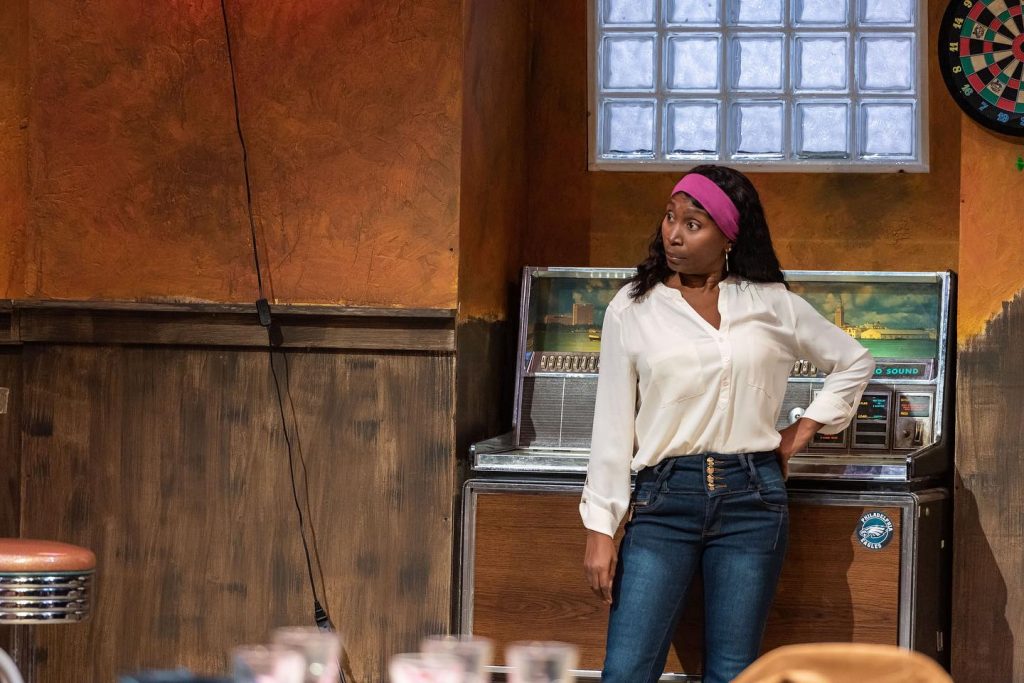By Lynn Venhaus
With its superlative cast, August Wilson’s powerful storytelling, and impressive milestones, “Radio Golf” is a triumph in all aspects.
Thoughtfully presented by the Black Repertory Theatre of St. Louis through June 8 in the Edison Theatre, this shrewdly observant play says so much about at what cost is doing the right thing vs. getting ahead. While it is set 1997, it speaks to issues for the ages.
The premise of Wilson’s 10th and final play is about a real estate entrepreneur who is determined to become Pittsburgh’s first black mayor. Set in the Hill District, Harmond Wilks and his business partner Roosevelt Hicks are golf enthusiasts with big plans for the neighborhood, and their future. But at what risk?
Their office, Bedford Hills Redevelopment Inc., is a storefront on Centre Avenue. The two partners talk of their hopes and dreams as they work on a modern housing and shopping development that will include Whole Foods and Starbucks.
Ronald L. Conner, a St. Louis native now living in Chicago, is a fiery, slick, upwardly mobile Roosevelt who is a bank vice-president and plays golf games to get ahead. Being accepted by the Country Club movers-and-shakers is a goal that he feels is within reach.
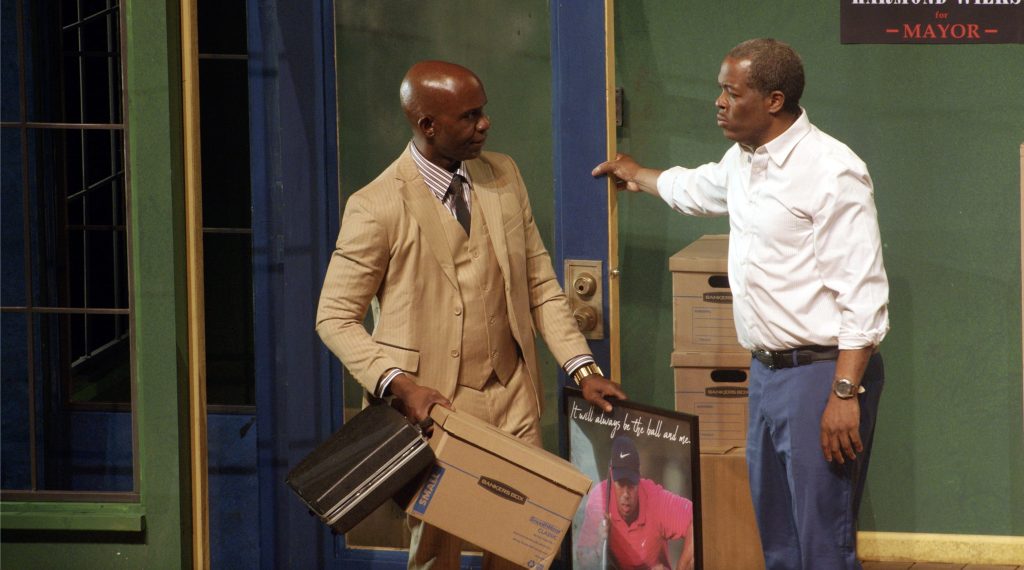
Reginald L. Wilson, in a slow-burn riveting performance, views the development as a way to lift people up. But a block of the Hill District must be torn down. It’s his Black Rep debut but he has immersed himself in Wilson’s works, and previously starred in “Ma Rainey’s Black Bottom” and “Fences.”
Where Harmond and Roosevelt see blight, others see the heritage that marks the tight-knit families who grew up there. He isn’t looking at the other side – and both a cranky yet wise Old Joe Barlow and no-nonsense handyman-contractor Sterling Johnson remind him of people’s worth, no matter their economic means or position.
Himes is unabashedly brilliant and the audience’s favorite character as Joe, a neighborhood elder who knows its history. He also remembers Harmond’s father who was in the real estate business. Blunt and smart like a fox, Joe tells it like it is.
As street-smart Sterling, Kelvin Roston Jr. is the play’s conscience. A good judge of people and their motives, he warns Harmond about neglecting the reasons why people value their history and turning his back on his neighbors. An ex-con who has lived a colorful life, and his dialogue just sings with authenticity, thanks to Roston.
Savvy Velma Austin is the lone female in the cast, portraying Mame, Harmond’s ambitious wife and public relations professional. She is looking ahead and extremely conscious of image. She doesn’t want him to jeopardize the path they envision for their future.
The conflicts occur organically because the ensemble is skilled in delivering Wilson’s rhythmic prose, making their characters’ struggles well-grounded.
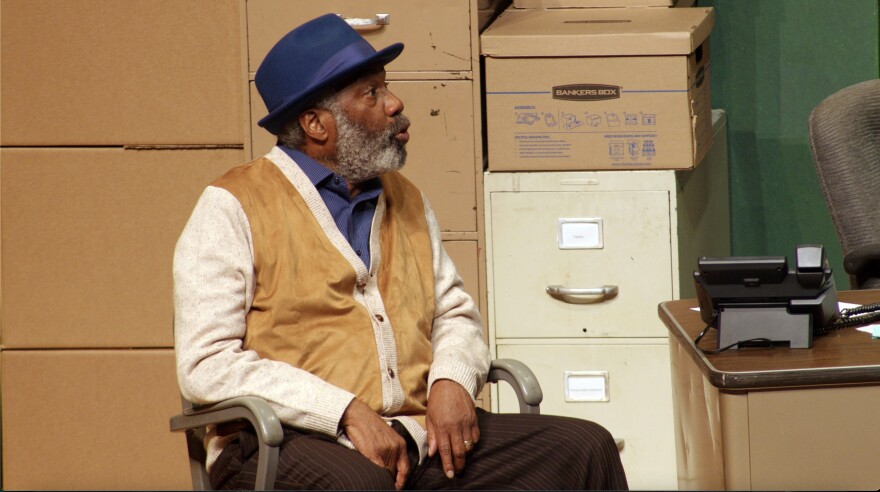
Director Jon Royal’s layered approach allows Wilson’s realistic dialogue to breathe and to build with tense clashes.
Jim Burwinkel’s scenic design aptly encapsulates Wilks’ needs and his hopes – an MLK poster is near his desk and a Tiger Woods poster is near Roosevelt’s. Lighting designer Jayson Lawshee captures times of day through the windows and Justin Schmitz’ astute sound design includes a terrific soundtrack.
Also setting the moods were costume designer Shevare Perry, who fits the period well, and Mikhail Lynn, who nailed the props, such as stolen golf clubs.
In “Radio Golf,” like he has touched on so eloquently before, Wilson examines the lifelong practices of white-run institutions, and whether minorities getting a place at the table was lip service, or another way for control, or an opportunity. And what would you do to ensure that opportunity?
All good, thoughtful points. As Martin Luther King once said, “The time is always right to do the right thing.”
Wilson published the play before his death in 2005, long before social media could have exploited the efforts of people involved to do the right thing vs. the corporate and political spins of the day. However, at that time, the outrage that is the norm when righteous dudes stand up for rights and beliefs now is sadly absent.

Wilson’s monumental American Century Cycle covers 100 years of the Black experience in America, chronicling social and historical changes in his remarkable style. He won Pulitzer Prizes for two of the plays – “Fences” and “The Piano Lesson.”
“Radio Golf” is the Black Rep’s second completion of the cycle, which took them 18 years to achieve. The Black Rep first completed it – only the third company in the U.S. to do so – from 1988 to 2003.
Starting in 2007, they have presented Wilson’s collection in chronological order. Thanks to the Black Rep, since 2012, I have seen seven of Wilson’s works, and each one has been a gem to treasure.
“Radio Golf” is also a record for actors Himes, founder and producing artistic director of the Black Rep, and Conner, who complete their own personal cycle this go-round.
They have earned St. Louis Theater Circle awards for outstanding production of a drama with Wilson’s “Two Trains Running” in 2022 and “Jitney” in 2023, and Ron Himes won best actor for “Fences.”
All 10 powerful in their own ways, these finely acted and impeccably produced shows illuminate black heritage and specific challenges as only Wilson can, and it’s always the right time to be reminded of his humanity.
With vibrant performances, The Black Rep’s “Radio Golf” is a masterful production that elevates its timeless message for today.
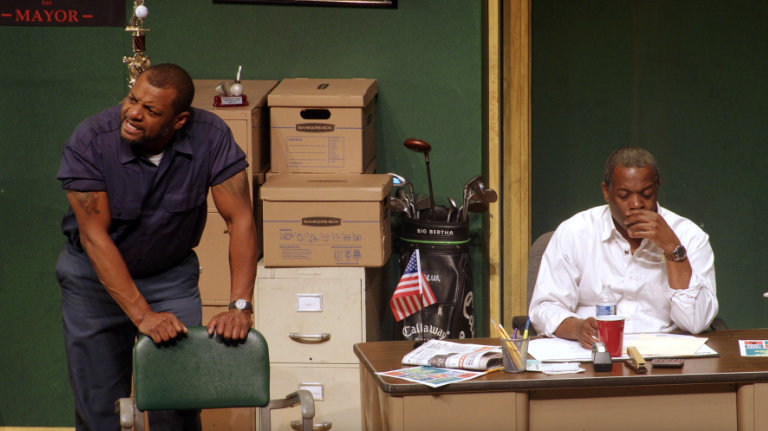
The St. Louis Black Repertory Company presents “Radio Golf” through June 8. The opening weekend of May 16 – 18 was cancelled because of tornado damage, and performances have been added from Thursday, June 5 to Sunday, June 8. A portion of those ticket sales will support tornado relief. Performances take place in the Edison Theatre on the campus of Washington University with support from The Whitaker Foundation. For more information: www.theblackrep.org Box Office at 314-534-3807. Reduced pricing is available for seniors, educators, museum staff, students, and groups of 12 or more.

Lynn (Zipfel) Venhaus has had a continuous byline in St. Louis metro region publications since 1978. She writes features and news for Belleville News-Democrat and contributes to St. Louis magazine and other publications.
She is a Rotten Tomatoes-approved film critic, currently reviews films for Webster-Kirkwood Times and KTRS Radio, covers entertainment for PopLifeSTL.com and co-hosts podcast PopLifeSTL.com…Presents.
She is a member of Critics Choice Association, where she serves on the women’s and marketing committees; Alliance of Women Film Journalists; and on the board of the St. Louis Film Critics Association. She is a founding and board member of the St. Louis Theater Circle.
She is retired from teaching journalism/media as an adjunct college instructor.

